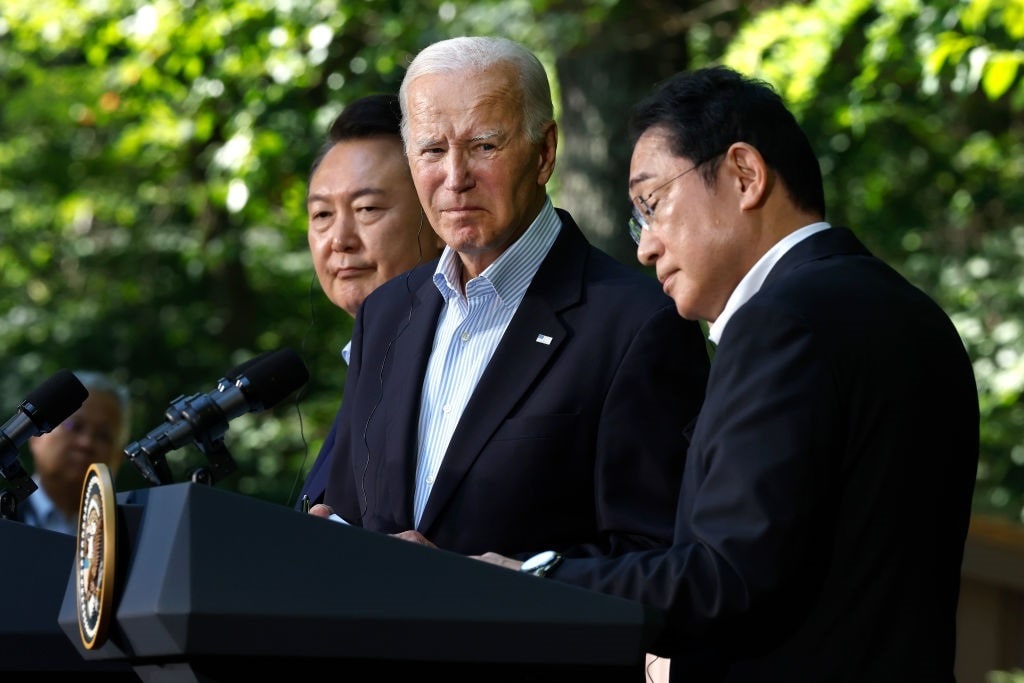On Friday, August 18, President Joe Biden played host to a Trilateral Leaders Summit meeting at Camp David with the Republic of Korean President Yoon Suk Yeol and Japan’s Prime Minister Fumio Kishida. The get-together was billed as an opportunity to build and strengthen ties between the two Pacific nations. In times past, the relationship between Japan and South Korea has been strained. The Biden administration’s stated purpose and hoped-for outcome was not welcomed by the biggest threat to peace in the Indo-Pacific – China.
Indo-Pacific Unity Is Key
The meetings also further the goals of outreach to Indo-Pacific allies and friends. In a press briefing at the US State Department on August 16, John Kirby, spokesman for Biden’s National Security Council (NSC), explained:
“Beyond modernizing our bilateral alliances with both countries, President Biden has taken key steps with both the prime minister and the president to improve and to make more routine cooperation throughout and across our governments, all aimed at addressing some of our most complex problems. The United States, as a facilitator, has encouraged dialogue among the three countries on a broad spectrum of areas.”
As encouraging as Kirby’s words might seem, they missed the mark on identifying what the real focus should be. It did not go unnoticed by the press in attendance. David Smith of The Guardian asked: “Will threats to Taiwan from China be on the agenda in this meeting?” To which Kirby went full flack with one of the inanest answers. “But it is not about the PRC (People’s Republic of China), and it’s not about a specific challenge in the region. It is really about the broader challenge of improving our trilateral cooperation,” the NSC spokesman said with a straight face. Get real. Of course, it is. How could the summit not be about China?
Guess who does think it’s about China: China. “China opposes relevant countries assembling exclusionary groupings, and practices that intensify antagonism and undermine the strategic security of other countries. China hopes that relevant countries will act in line with the trend of the times and contribute to regional peace, stability and prosperity,” Chinese foreign ministry spokesman Wang Wenbin complained at a regularly scheduled press briefing.
National Security Advisor Identifies Threat

(L-R) South Korean President Yoon Suk Yeol, U.S. President Joe Biden, and Japanese Prime Minister Kishida Fumio (Photo by Chip Somodevilla/Getty Images)
Unlike Kirby, National Security Advisor Jake Sullivan was more forthcoming and realistic in his press statements at the beginning of Friday’s talks. “We’re announcing significant steps to enhance trilateral security cooperation in the region in the face of North Korean provocations, including a multi-year exercise plan, deeper coordination and integration on ballistic missile defense and improving information sharing and crisis communications,” Sullivan explained. At least the national security advisor pointed to North Korea as a threatening presence in the region. Then after just identifying North Korea as provocative, Sullivan, as if suddenly remembering the Kirby party line, hastens to add, “And then finally, I would just underscore that this summit today, this partnership is not against anyone. It is for something. It is for a vision of the Indo-Pacific that is free, open, secure, and prosperous.”
Having a solid, mutually beneficial national security relationship among Japan, South Korea, and the United States is a good move by the Biden administration. The whistling-passed-the-graveyard approach to China is just silly and not credible. Nonetheless, having Japan and South Korea on the same page goes a long way to salve the deep, bitter, and lingering resentment over World War II events on the Korean peninsula. “The Japan-South Korea relationship is a delicate one because of differing views of World War II history and Japan’s colonial rule over the Korean Peninsula. Past efforts to tighten security cooperation between Seoul and Tokyo have progressed with fits and starts,” Aamer Madhani reported for Associated Press.
Additionally, whether Biden wants to single out China as a forcing function for bringing Japan and South Korea together at Camp David, both Indo-Pacific nations “share concerns about China’s assertiveness in the Pacific,” Madhani explained. Building a bulwark of like-minded Indo-Pacific nations to isolate China and North Korea if necessary or persuade the enemies in the region to modify their threatening behavior if possible is essential to a containment strategy. The Biden national security team has been reluctant to reveal an actionable plan for the region. However, outreach efforts like the Trilateral Leaders Summit are encouraging.




